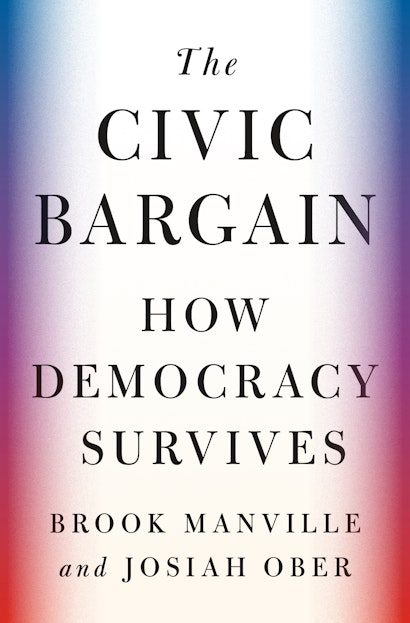Democracy today is in trouble: we see free governments wobbling, political tribalism everywhere, and rising authoritarianism. America, once the showcase of democracy done right now seems a system gone wrong. The percentage of citizens surveyed by Pew Research who “trust that the government mostly does the right thing” has fallen from 75% to 20%. Debate rages about causes. “It’s all the fault of the other political party;” “rapacious corporations;” “the curse of social media.” Proposed remedies seem narrow or simply partisan: abolish the Electoral College; cut taxes; expand the Supreme Court. Others demand ideological revolution: end inequality; restore liberalism; destroy wokeness. Rarely explained is why any particular ailment or supposed fix is more critical than others. Citizens across the political spectrum remain unhappy, seeing no path forward.
Today’s challenges are significant. But we can start making progress if we go back to fundamentals. We must find and tackle root causes: look back in history to understand democracy’s essence, and what has made it successful through time. How did democracy come to be? What kept it going? We studied four cases—ancient Athens and Rome, modern Britain and America, each of which lasted—or have lasted—over centuries. We identified a pattern of democratic emergence, practices, and norms that, when embraced by citizens, enabled survival. Those practices and norms are “the civic bargain.”
Historical Insights
The specifics of the civic bargain emerge from the history of the four democracies. Each case developed a different approach to self-governance. But each began by rejecting a “boss”—subjects overthrowing a king, tyrant, or aristocratic elite, and establishing instead citizens ruling themselves. This provides a simple definition of “democracy”—“self-governance by equal citizens, free of a boss.” And that clarifies the question of what a surviving democracy must preserve. Our definition of democracy also points to the issue that citizens must confront, once rid of their boss: How will we make decisions once we are free?
Answering that question is always contentious. Once the boss is gone—and thus, with no one setting the agenda or preserving order—anarchy looms. Anyone who has tried to “democratically” organize, for example, a company picnic knows the dilemma. People want to be free—but give them all an equal voice, and chaos often follows. This “problem of collective action” means that when people get rid of a boss, they must get a new one: either another autocrat or each other.
Negotiating a Civic Bargain
Enter the civic bargain. History shows that, to overcome the post-revolution problem of collective action, citizens of resilient democracies devised ways to create practical self-governance. Looking across the cases, we identified a cluster of seven essential conditions for effective self-government. This civic bargain has been the “ground zero” for democracy.
The conditions include formal rules and less tangible attitudes and habits. Civic bargains were not created all at once, but rather gradually evolved, through negotiation, learning-by-doing, and sometimes violent conflict. Representatives might lead the development of the bargain, but citizens themselves were the ultimate decisionmakers.
Seven Essential Conditions
In each historical democracy, the same seven conditions are visible. Each poses key questions democratic citizens must answer, once free of a boss.
1. No boss—except each other: Will we commit to keep our newfound liberty? No self-governing community can survive without that commitment.
2. Security and Welfare—Are we prepared to ensure basic safety and a decent standard of livelihood? The bargain collapses if we’re worse off than we were under the boss.
3. Defined Citizenship—Who is a citizen, who is not? What must citizens “get” and “give” to make self-governance work? Citizens must share the burden of operating without a boss.
4. Citizen-led institutions—Can we formalize rules and processes for decision-making and conflict resolution, led by ourselves?
5. Good faith negotiation—Are we willing to compromise, to preserve the common good? Self-governing citizens must acknowledge differences of human priorities, and pragmatically accept less than perfect outcomes. Democracy is a bargain, never an absolute.
6. Civic friendship—Can we deal with one another with enough comity and respect to maintain collective decision-making? When citizens seek to destroy or demonize political opponents, they undermine future bargaining that keeps democracy alive.
7. Civic education—Will we instill the knowledge and practical skills of self-government in tomorrow’s citizens? Democracy cannot survive unless the current generation builds future capability to meet new threats and circumstances.
Why Democracy is Never Finished
The civic bargain of resilient democracies operates under the assumption of continuing adjustment and adaptation. All communities, self-governing or not, must adapt to remain viable. Democracies face paradoxical “challenges of scale”: When successful, they grow bigger and more diverse. More citizens with diverse skills and knowledge create more opportunities for innovation and problem solving. But increasing scale also makes the bargaining that sustains self-government more difficult. Citizens must treat their community and the civic bargain that sustains it as a living set of agreements. Democracy is an ongoing process; it is never done.
Diagnosing Our Problems Anew
So, what does this mean for American democracy now? The seven conditions of a civic bargain offer a tool to assess and address today’s core problems:
1. No boss: Many citizens are now unwilling to accept debate and negotiation as the price of freedom. The desire for “strong leadership” opens the way to the rule of a boss.
2. Security and Welfare: We are divided about how threatening powers like China, Iran and Russia really are; and whether our investment in social welfare and public safety is sufficient, too much, or being spent the right way.
3. Citizenship: We are divided about what do about illegal immigration and how many legal immigrants to admit. Meanwhile identity politics sparks proliferating demands for ever more individual rights, without clarity about what duties each right imposes on citizens.
4. Citizen-led institutions: Our major democratic institutions are under great pressure for reform, but we lack a roadmap for the adaptation necessary to meet the challenges of new technologies and increasing scale.
5 & 6. Good faith compromise, and Civic Friendship: Each of the above conditions can potentially be tackled—but not without rebuilding a culture of bargaining, compromise, and civic friendship. An ethos of total partisan victory and enemy destruction is increasingly the norm of party politics, and infects attitudes of ordinary citizens. We need to rebuild the norms and commitment to problem-solving together, crafting answers acceptable to a majority of citizens.
7. Civic Education: After decades of neglect, Americans from across the political spectrum have come to recognize the importance of educating future citizens in the skills and knowledge essential for self-governance. But we have yet to come together about “telling our American story” in a way both authentic and constructive.
***
Much work will be needed to renew America’s once strong civic bargain. Understanding the core features of that bargain is the first step. Americans don’t need to rebuild trust that “the government” is doing the right thing. What we need is to rebuild is our trust in each other—our ability to adapt to a fast-changing world by bargaining productively together. That is what the citizens of historical democracies once did. We can and must learn from their example.
Brook Manville is an independent consultant who writes about politics, democracy, technology, and business. Previously a partner with McKinsey & Co. and an award-winning professor at Northwestern University, he is the author of The Origins of Citizenship in Ancient Athens (Princeton) and A Company of Citizens: What the World’s First Democracy Teaches Leaders About Creating Great Organizations (with Josiah Ober).
Josiah Ober is the Constantine Mitsotakis Professor in the School of Humanities and Sciences at Stanford University and Senior Fellow at the Hoover Institution. He is the author of The Rise and Fall of Classical Greece, Democracy and Knowledge: Innovation and Learning in Classical Athens (both Princeton), The Greeks and the Rational: The Discovery of Practical Reason, and other books.

